
The politics of Italy are conducted through a parliamentary republic with a multi-party system. Italy has been a democratic republic since 2 June 1946, when the monarchy was abolished by popular referendum and a constituent assembly was elected to draft a constitution, which was promulgated on 1 January 1948.
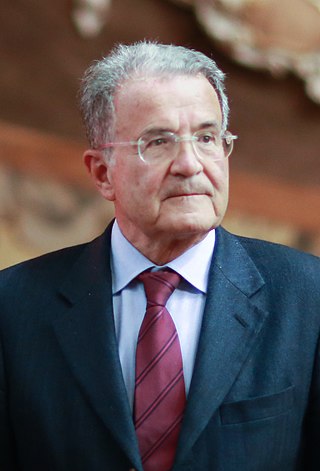
Romano Prodi is an Italian politician, economist, academic, senior civil servant, and business executive who served as the tenth president of the European Commission from 1999 to 2004. He served twice as Prime Minister of Italy, first from 18 May 1996 to 21 October 1998, and then from 17 May 2006 to 8 May 2008. Prodi is considered the founder of the Italian centre-left and one of the most prominent and iconic figures of the Second Republic. He is often nicknamed Il Professore due to his academic career.

The Democrats of the Left was a social-democratic political party in Italy. Positioned on the centre-left, the DS, successor of the Democratic Party of the Left (PDS) and the Italian Communist Party, was formed in 1998 upon the merger of the PDS with several minor parties. A member of The Olive Tree coalition, the DS was successively led by Massimo D'Alema, Walter Veltroni, and Piero Fassino, and merged with Democracy is Freedom – The Daisy and a number of minor centre-left parties to form the Democratic Party in October 2007.
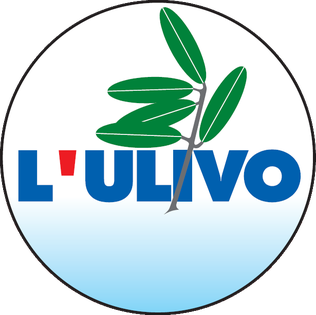
The Olive Tree was a denomination used for several successive centre-left political and electoral alliances of Italian political parties from 1995 to 2007.
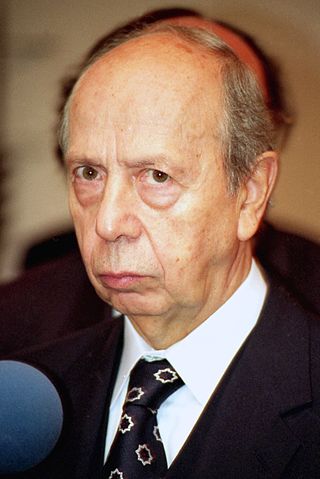
Lamberto Dini is an Italian politician and economist. He was the Director General of Bank of Italy from 1979 to 1994, Minister of Treasury from 1994 to 1996, the 51st Prime Minister of Italy from 1995 to 1996, and Foreign Minister from 1996 to 2001.

The 2006 Italian general election was held on 9 and 10 April 2006. Romano Prodi, leader of the centre-left coalition The Union, narrowly defeated the incumbent Prime Minister Silvio Berlusconi, leader of the centre-right coalition House of Freedoms. Initial exit polls suggested a victory for Prodi, but the results narrowed as the count progressed. On 11 April 2006, Prodi declared victory; Berlusconi never conceded defeat and an ensuing dispute formed.

The Party of Italian Communists was a communist party in Italy established in October 1998 by splinters from the Communist Refoundation Party (PRC). The split was led by Armando Cossutta, founder and early leader of the PRC, who opposed Fausto Bertinotti's leaderhip and, especially, his decision to withdraw support from Romano Prodi's first cabinet. In December 2014, the party was transformed into the Communist Party of Italy (PCd'I), which would later evolve into the new version of the Italian Communist Party (PCI).
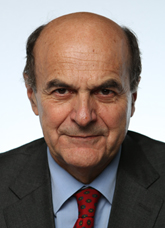
Pier Luigi Bersani is an Italian politician and was Secretary of the Democratic Party (PD), Italy's leading centre-left party, from 2009 to 2013. Bersani was Minister of Industry, Commerce and Craftmanship from 1996 to 1999, President of Emilia-Romagna from 1993 to 1996, Minister of Transport from 1999 to 2001, and Minister of Economic Development from 2006 to 2008.

The 1996 Italian general election was held on 21 April 1996 to elect members of the Chamber of Deputies and the Senate of the Republic. Romano Prodi, leader of the centre-left The Olive Tree, won the election, narrowly defeating Silvio Berlusconi, who led the centre-right Pole for Freedoms.
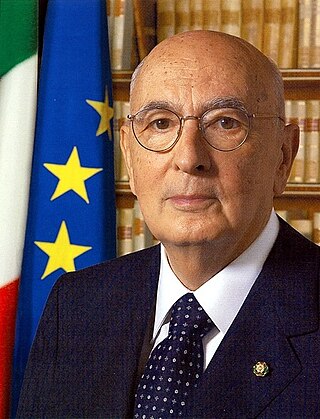
Giorgio Napolitano was an Italian politician who served as the president of Italy from 2006 to 2015, the first to be re-elected to the office. In office for 8 years and 244 days, he was the longest-serving president, until the record was surpassed by Sergio Mattarella in 2023. He also was the longest-lived president in the history of the Italian Republic, which has been in existence since 1946. Although he was a prominent figure of the First Italian Republic, he did not take part in the Constituent Assembly of Italy that drafted the Italian constitution; he is considered one of the symbols of the Second Italian Republic, which came about after the Tangentopoli scandal of the 1990s. Due to his dominant position in Italian politics, some critics have sometimes referred to him as Re Giorgio.

The first Prodi government was the 53rd government of Italy. It held office from 18 May 1996 until 21 October 1998.

The third Berlusconi government was the cabinet of the government of Italy from 23 April 2005 to 17 May 2006. It was the 58th cabinet of the Italian Republic, and the second cabinet of the XIV Legislature.
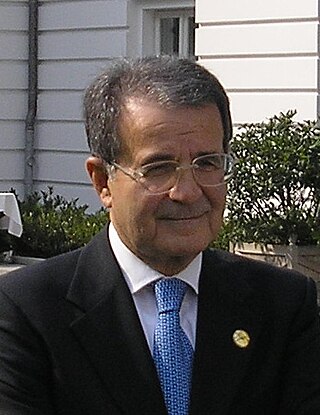
On 24 January 2008, the Italian prime minister Romano Prodi lost a vote of confidence in the Senate of the Republic, which caused the collapse of the second Prodi government. Prodi's resignation led the Italian president Giorgio Napolitano to ask the president of the Senate, Franco Marini, to attempt to form a caretaker government. After Marini acknowledged an interim government could not be formed due to the lack of a clear majority in the Italian Parliament willing to support it, a snap election was scheduled for 13–14 April 2008.

A snap election was held in Italy on 13–14 April 2008. The election came after President Giorgio Napolitano dissolved the Italian Parliament on 6 February 2008, following the defeat of the government of Prime Minister Romano Prodi in a January 2008 Senate vote of confidence and the unsuccessful tentative appointment of Franco Marini with the aim to change the current electoral law. Under Italian law, elections must be held within 70 days of the dissolution. The voting determined the leader of Italy's 62nd government since the end of World War II. The coalition led by ex-Prime Minister Silvio Berlusconi from The People of Freedom party defeated that of former Mayor of Rome, Walter Veltroni of the Democratic Party.
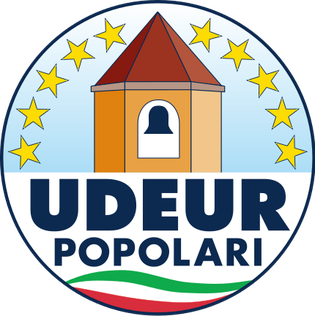
The Union of Democrats for Europe, also known as UDEUR Populars, was a minor centrist, Christian-democratic political party in Italy.

The first D'Alema government was the government of Italy from 21 October 1998 to 22 December 1999.

The Letta government was the 62nd government of the Italian Republic. In office from 28 April 2013 to 22 January 2014, it comprised ministers of the Democratic Party (PD), The People of Freedom (PdL), Civic Choice (SC), the Union of the Centre (UdC), one of the Italian Radicals (RI) and three non-party independents.
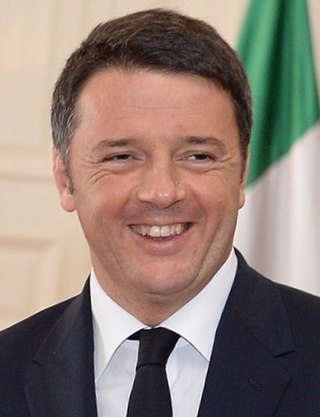
The Renzi government was the 63rd government of the Italian Republic, in office from February 2014 to December 2016. It was led by Matteo Renzi, secretary and leader of the centre-left Democratic Party (PD).

The Communist Refoundation Party is a communist political party in Italy that emerged from a split of the Italian Communist Party (PCI) in 1991. The party's secretary is Maurizio Acerbo, who replaced Paolo Ferrero in 2017. Armando Cossutta was the party's founder, while Fausto Bertinotti its longest-serving leader (1994–2008). The latter transformed the PRC from a traditional communist party into a collection of radical social movements.
The centre-left coalition is a political alliance of political parties in Italy active under several forms and names since 1995, when The Olive Tree was formed under the leadership of Romano Prodi. The centre-left coalition has ruled the country for more than fifteen years between 1996 and 2022; to do so, it had mostly to rely on a big tent that went from the more radical left-wing, which had more weight between 1996 and 2008, to the political centre, which had more weight during the 2010s, and its main parties were also part of grand coalitions and national unity governments.















































